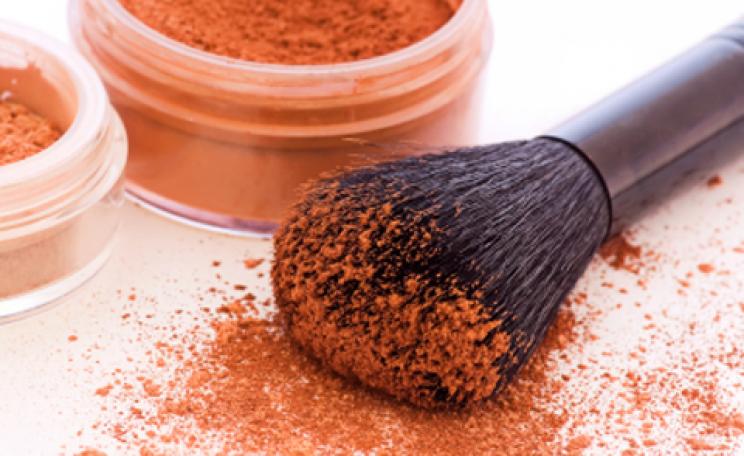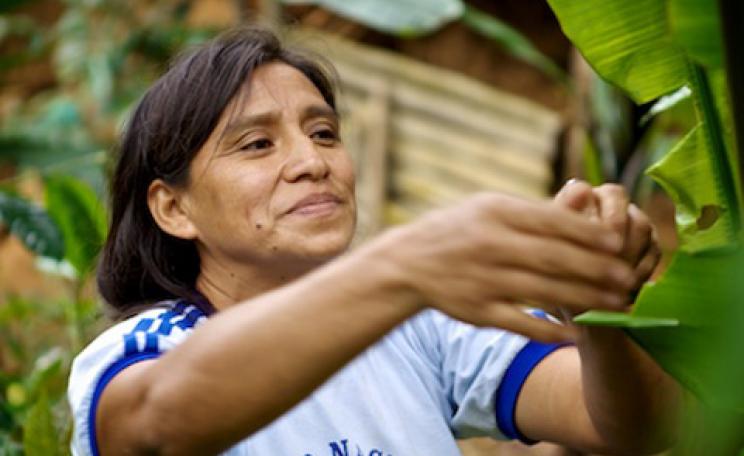What Valerie Roubaud describes as ‘work’ sounds more like an extended dream holiday. The founder of French beauty brand Terre d’Oc has a job that revolves around travelling to exotic places in search of ancient beauty rituals. To date, this job spec has taken her to Morocco, India, Bali, Japan and Burkina Faso. But she’s clearly cut out for it: Roubaud has a gift for uncovering beauty gold in the unlikeliest places. She put ochre, the reddish clay found in her native Provence, on the beauty map, using it to launch a mineral make-up range back in the mid-1990s. Building on her success, she has since created a string of skincare ranges that tap in to hidden traditions and ingredients from around the world. Today, Terre d’Oc offers over 200 all-natural products ranging from mineral make-up to herbal teas.
Ochre has a long history in France. ‘When I was young my grandmother used these colours to paint the walls,’ reminisces Roubaud. ‘The Provencal ochre is very bright but these are natural pigments that are very safe and easy to use. If you've ever been to Provence, you'll notice our houses are painted orange, red and yellow colours. They are colours that come from earth, from the soil.’ But the arrival of synthetically made colours proved a disaster for Provencal ochre. When Roubaud launched Terre d’Oc with her partner Patrick Lions in 1995, she says there was only one factory in the town of Apt (east of Avignon) remaining that produced ochre in the traditional way. ‘We wanted to do something to stop this factory from disappearing and this is why we decided to launch the gift box with nine different natural colours. All our ochre still comes from this one factory.’
 But in reviving traditional ochre, Roubaud set out on a journey that has led her far from home, and in philosophical terms, far from the mainstream beauty market. Instead of experimenting with high-tech chemicals, she avoids synthetics altogether. ‘I love beauty, beauty stories and beauty secrets. In Africa, India and Asian countries, women have their own secrets about beauty and on my travels I go to visit these women,’ she says. By way of example, she describes a trip to Japan 10 years ago: ‘I was at an “onsen” or hot spring bath, not the touristic spas, but at a very old, traditional bath. There I saw an elderly woman using salt crystals in the bath. I asked what it was and she explained that salt comes from thermal springs and has [beautifying] properties so it gave me the idea to create a collection about onsen and hot springs and traditional baths. It's a volcanic salt and we mix the salt with water and it gives detoxifying and anti-pollution properties to the cosmetics.’ In each of the five culturally inspired skincare lines, there are active ingredients based on traditional beauty rituals. Moroccan Touareg women add saffron to ochre to make golden eye shadows, while Japanese women use rice powder to achieve a porcelain complexion and Balinese women marinate bright petals in coconut oil for make-up. ‘We’ve found that these very traditional ingredients such oils, butters and powders that women have in their kitchens or gardens have anti-aging and antioxidant properties and are very moisturising,’ she says.
But in reviving traditional ochre, Roubaud set out on a journey that has led her far from home, and in philosophical terms, far from the mainstream beauty market. Instead of experimenting with high-tech chemicals, she avoids synthetics altogether. ‘I love beauty, beauty stories and beauty secrets. In Africa, India and Asian countries, women have their own secrets about beauty and on my travels I go to visit these women,’ she says. By way of example, she describes a trip to Japan 10 years ago: ‘I was at an “onsen” or hot spring bath, not the touristic spas, but at a very old, traditional bath. There I saw an elderly woman using salt crystals in the bath. I asked what it was and she explained that salt comes from thermal springs and has [beautifying] properties so it gave me the idea to create a collection about onsen and hot springs and traditional baths. It's a volcanic salt and we mix the salt with water and it gives detoxifying and anti-pollution properties to the cosmetics.’ In each of the five culturally inspired skincare lines, there are active ingredients based on traditional beauty rituals. Moroccan Touareg women add saffron to ochre to make golden eye shadows, while Japanese women use rice powder to achieve a porcelain complexion and Balinese women marinate bright petals in coconut oil for make-up. ‘We’ve found that these very traditional ingredients such oils, butters and powders that women have in their kitchens or gardens have anti-aging and antioxidant properties and are very moisturising,’ she says.
But because ingredients are all important, Roubaud’s supplier relationships extend far beyond the norm. ‘Because these women are agreeing to give me their secrets, I must give them something back. By that I don't mean paying a good price for their ingredients but giving more. The best way to give more is to have a Fairtrade relationship with these ingredients. My idea, my vision about Fairtrade, is not about paying twice more than the market; it is to help the women, for example when they can't read, it is to help them read. In Morocco, a lot of women have never been to the doctor and I think it is very important to pay for these visits and improve access to healthcare’. Terre d’Oc initiates and supports projects that build up rural infrastructure, education and healthcare for traditional communities.
 ‘If I don't know exactly how an ingredient was sourced, I don’t buy it. My team and I are travelling all the time to visit factories and I work with a French company in Paris that visits factories all over the world and does audits to understand and check how the factory works and about the social and environmental conditions. It's very, very important,’ she adds.
‘If I don't know exactly how an ingredient was sourced, I don’t buy it. My team and I are travelling all the time to visit factories and I work with a French company in Paris that visits factories all over the world and does audits to understand and check how the factory works and about the social and environmental conditions. It's very, very important,’ she adds.
Terre d’Oc’s mineral make-up range has 57 products including a best selling mineral foundation; lipsticks in soft colours formulated with argan oil and shea butter, and eye make-up inspired by Moroccan kohl that is soft on the eyes, formulated with peppermint and almond oils and pomegranate powder. By marrying rural Provence with worldly beauty secrets, and in helping make mineral make-up sophisticated and aspirational, Terre d’Oc will help win over more than a few eco beauty sceptics.
Photos: © M. Cecconi, © F. Goudier. Find out more at www.terredoc.co.uk
| READ MORE... | |
 |
GREEN LIVING Death by jasmine: why organic perfumery is under threat Is real jasmine really worse for you than the synthetic version? It might sound crazy but that's exactly what the International Fragrance Association believe – and it’s making life tough for organic and natural perfumers. Ruth Styles reports |
 |
GREEN LIVING The Ecologist meets… Korres co-founder, Lena Korres Greece might be in dire financial straights but for the country’s best-known natural beauty brand, things have never been better. Ruth Styles caught up with Lena Korres to find out why |
 |
GREEN LIVING Heavenly honey: why the golden stuff is good news for your skin A natural moisturiser packed with antioxidants, honey is a sweet treat that can make a big difference to your dermis |
 |
GREEN LIVING Tried and tested: facial oils No longer is moisturiser the only way to hydrate your skin. Thanks to Shu Uemura’s pioneering oil-based range, facial oils are becoming a serious alternative to traditional creams. But which are the most planet friendly? |
 |
GREEN LIVING How to get fit, healthy (and slim) the natural way Thanks to celebrity mums, the pressure to shape up post birth has never been higher. But don’t succumb to extreme diets; as the Ecologist’s natural fitness experts explain, slow and steady wins the race |








